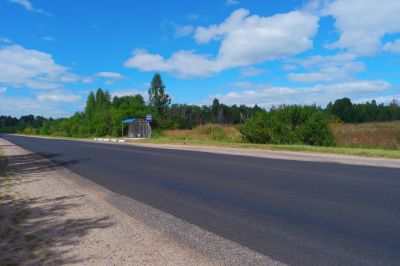Favorite Asphalt Sealants For Easy Application And Strong Results
Identify the most popular asphalt sealing options that combine user-friendly application with effective surface protection.
 In Oklahoma City, where the climate can vary and pavement longevity is essential, selecting the right products for asphalt sealing is crucial for maintaining durable and well-protected driveways and parking lots. Asphalt sealers serve as a protective barrier against water, UV rays, and other environmental elements that can cause deterioration over time. The variety of products available includes liquid sealers, acrylic-based coatings, coal tar emulsions, and specialty formulations designed for specific needs. Proper application and choosing the appropriate product type can significantly extend the lifespan of asphalt surfaces, helping property owners preserve their investments.
In Oklahoma City, where the climate can vary and pavement longevity is essential, selecting the right products for asphalt sealing is crucial for maintaining durable and well-protected driveways and parking lots. Asphalt sealers serve as a protective barrier against water, UV rays, and other environmental elements that can cause deterioration over time. The variety of products available includes liquid sealers, acrylic-based coatings, coal tar emulsions, and specialty formulations designed for specific needs. Proper application and choosing the appropriate product type can significantly extend the lifespan of asphalt surfaces, helping property owners preserve their investments.
Top Overall Option
Premium Asphalt Sealer
A versatile, high-quality liquid asphalt sealer designed for ease of application and long-lasting protection. It provides a smooth finish and excellent adhesion to various asphalt surfaces, making it suitable for both residential and commercial projects. Its formulation aims to resist water penetration and UV damage, helping to preserve the integrity of the pavement over time.
Types of Products For Asphalt Sealings
Liquid Asphalt Sealers
Thin, liquid coatings that are easy to apply and provide a protective barrier against environmental elements.
Acrylic Sealers
Water-based coatings that offer a glossy finish and enhanced UV resistance for asphalt surfaces.
Coal Tar Emulsions
Durable sealers known for their strong adhesion and resistance to chemicals and water.
Driveway Sealers
Specialized products formulated specifically for residential driveways, focusing on ease of application and aesthetic appeal.
Commercial Parking Lot Sealers
Heavy-duty sealers designed for large-scale applications with high traffic volumes.
Fast-Drying Sealers
Products that cure quickly, minimizing downtime between application and use.
Eco-Friendly Sealers
Formulations that aim to reduce VOC emissions while providing effective protection.
Rejuvenators
Products that restore flexibility and appearance to aging asphalt surfaces.
Emulsified Sealers
Water-based emulsions that are easy to clean up and apply, suitable for various conditions.
Polymer-Modified Sealers
Sealants enhanced with polymers for improved durability and flexibility.
Penetrating Sealers
Products that seep into the asphalt to provide internal protection against moisture.
Bituminous Coatings
Thicker coatings offering a robust protective layer for heavily trafficked surfaces.
Resin-Based Sealers
Sealants that incorporate resins for added adhesion and weather resistance.
Crack Fill Sealers
Products designed to fill and seal cracks before applying a topcoat for comprehensive protection.
Surface Prep Products
Cleaning and priming solutions essential for preparing asphalt surfaces prior to sealing.
Popular Choices
Widely used for their ease of application and reliable coverage across various asphalt surfaces.
Popular for their glossy finish and UV resistance, enhancing curb appeal.
Chosen for their durability and strong adhesion, suitable for high-traffic areas.
Commonly used in residential applications to protect and improve the appearance of driveways.
Preferred for projects requiring quick turnaround times.
Favored for their enhanced flexibility and longevity.
Popular for their ease of cleanup and application versatility.
Selected for their weather resistance and adhesion qualities.
Frequently used to address surface cracks before sealing for comprehensive protection.
Chosen for internal moisture resistance and surface preservation.
Essential for ensuring proper adhesion and optimal sealing results.
When considering asphalt sealing products, factors such as surface type, existing condition, and intended longevity come into play. Some products are formulated for quick application and fast drying, making them suitable for commercial projects with tight schedules. Others may focus on providing a more flexible or glossy finish, enhancing the aesthetic appeal of the pavement. Proper surface preparation, including cleaning and repairs, is essential before applying sealers to ensure optimal adhesion and performance. Regular maintenance and timely resealing can prevent costly repairs and keep asphalt surfaces looking their best.
Oklahoma City residents often choose products that perform well under the local weather conditions, including hot summers and occasional freeze-thaw cycles. Selecting products with proven durability and ease of application can make sealing projects more efficient and effective. Consulting with local suppliers or professionals can provide insights into the most suitable products for specific project needs. Whether for residential driveways or large commercial lots, understanding the different product options and their characteristics helps property owners make informed decisions to protect and enhance their asphalt surfaces.
Key Buying Considerations
- Determine the specific surface type and condition to select an appropriate product.
- Consider the intended longevity and frequency of resealing needed.
- Evaluate the ease of application and drying time to fit project schedules.
- Check product compatibility with existing asphalt and surface materials.
- Assess the level of UV and water resistance offered by the product.
- Decide between solvent-based and water-based formulations based on environmental and application preferences.
- Review the coverage area per unit to estimate quantities accurately.
- Look for products with good adhesion properties to prevent peeling or flaking.
- Consider the appearance finish—matte or glossy—based on aesthetic preferences.
- Evaluate the product’s resistance to chemicals, oils, and other common driveway contaminants.
- Ensure proper surface preparation guidelines are followed for optimal results.
- Check for certifications or standards indicating quality and safety.
- Review user feedback and professional recommendations for local conditions.
- Account for budget constraints while balancing quality and performance.
- Determine if additional surface prep or crack filling is necessary before sealing.
